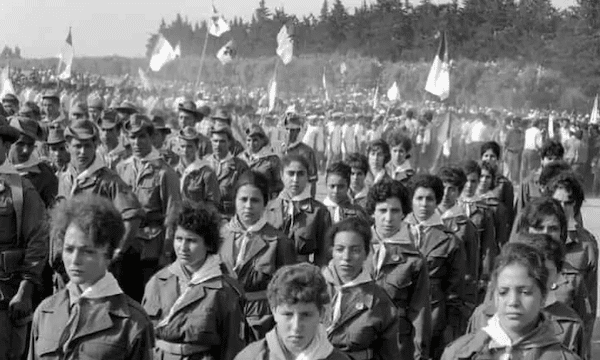Colonialism is not satisfied merely with holding a people in its grip and emptying the native’s brain of all form and content. By a kind of perverted logic, it turns to the past of the oppressed people, and distorts, disfigures and destroys it.
– Frantz Fanon, “The Wretched of the Earth”
The attacks on the past, as Fanon puts it, are also attacks on the history, culture, and very way of life of oppressed people.
Algeria had been occupied by the French since 1830. In the country, the French tried to secure their domination over the people through dismantling the cultural norms of Algerian society and maintaining an air of absolute violence on anyone who attempted to resist.
In colonial Algeria, infrastructure was named after famous settlers, colonists or military figures of the occupation.
In its colonial crusade to erase Islam from Algeria, France relied on deceit, intimidation, and brute force to replace Algerian Islamic culture with French, European, and Christian norms. Mosques were closed or converted into Catholic churches. Quranic schools were shut down or replaced with French-language Catholic schools.
Regarding news and media, French or colonial-friendly newspapers and radio stations were the main source of information and music that could be found in colonial Algeria.
Finally, the separation of the Algerian villages and towns from the cities and metropolises of the French colonists and settlers was maintained by military checkpoints and a deep culture of racism.
Committed to decolonization
In Fanon’s writings during the period, he details how the Algerian people, committed to liberation, were able to fight the French. The Algerian people were committed to decolonization, both physically with the removal of French troops and settlers and also culturally through destroying the idea of supremacy of Western values and destroying the divisions between people living in Algeria.
Women played a crucial role in Algeria’s War of Independence (1954–1962). Their contributions were vital to the success of the National Liberation Front (FLN) and the broader revolutionary movement.
Algerian women who joined the struggle used the French arrogance and chauvinism against them. Western-dressed women were able to move more freely across checkpoints, taking with them all sorts of material and equipment that could aid the revolution. Veiled women hid weapons, equipment or money under their wardrobes.
Women and men fought together. In cities, women were lookouts, guides and partners to their male counterparts, doing whatever was needed to beat back French occupation. Out in the mountains and countryside, women were armed to the teeth, carrying weaponry and heavy equipment to engage the French military.
Women and men not only fought side by side to achieve liberation, but the addition of women in the struggle on all fronts saved the very revolution itself.
Rejected French-friendly media
French domination was also challenged in the information space. The Algerian population rejected Radio Algiers and other French-friendly stations. These stations did nothing but affirm the colonial rule of the French in the region and normalize their genocidal strategy of occupation and suppression.
It was the “Voice of Fighting Algeria” that brought the news to the masses. This station was a direct lifeline to tap into the struggle for liberation. It was broadcast in many different languages, to include the entirety of Algeria’s diverse population.
Also, newspapers began to spring up that directly challenged the written word of the colonial administration, with the written testimonies of revolutionaries and survivors of French atrocities. The masses were able to tune into these new channels of information, gaining insight and guidance on the struggle and the path the new nation was now on. Also, through these new media outlets, organizing to disrupt the colonial war machine became easier.
Against kidnappings and torture in L.A. (and Gaza)
In the spirit of the revolutionary women of Algeria, indigenous and immigrant women in the United States are leading the struggle out West against the kidnappings and torture of their friends, family and coworkers. This is especially evident in Los Angeles, where women fill the ranks and largely lead organizations like the Community Self Defense Coalition. They do everything from creating literature, scouting for ICE, training new members, to actively alerting areas about ongoing ICE operations. They do everything they possibly can to disrupt this repressive machinery.
It is Black mothers and sisters who lead in the calls for justice against police brutality and terror, organizing their neighborhoods and communities to take action.
In today’s information sphere, corporate and state media are constantly challenged by independent reporting and smaller, more community-driven outlets.
In occupied Palestine, the Zionist entity is unable to destroy the ability of the Palestinian resistance to communicate to the outside world. Outlets like the Resistance News Network are able to get the word out about Palestinian victories over the Zionist enemy while also revealing the truth about Israeli massacres of civilian populations all around the Gaza Strip.
People in Palestine and Los Angeles (and worldwide) are recording police as they attack peaceful demonstrations and also recording atrocities against civilians to share with the world, destroying narratives that normalize genocide and occupation.
Fanon’s teachings are applicable on any scale of struggle, from labor struggles to wars of national liberation. His teachings on anti-imperialist and anti-colonial resistance provide strategies for survival and resistance against the capitalist system.
It is capitalism that tears communities apart to make room for profits, capitalism that pits communities against each other, capitalism that strangles human rights for the sake of the dollar, capitalism that enables the oppression of women and other oppressed people, capitalism that normalizes genocide for the creation of markets, and finally capitalism that nurtures the rise of fascism.

